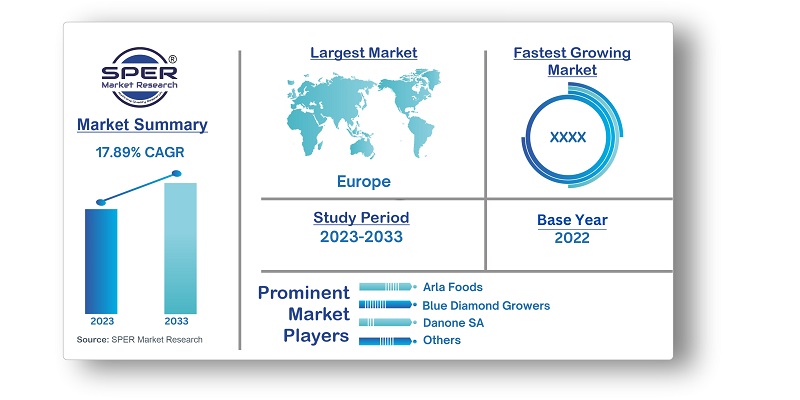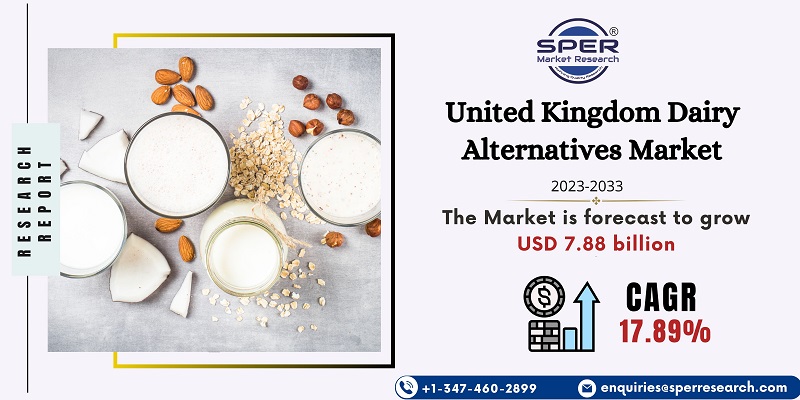
UK Dairy Alternatives Market Growth, Size, Trends, Revenue, Demand, Share and Future Outlook
United Kingdom Dairy Alternatives Market Size- By Category, By Distribution Channel- Regional Outlook, Competitive Strategies and Segment Forecast to 2033
| Published: Dec-2023 | Report ID: FOOD23106 | Pages: 1 - 107 | Formats*: |
| Category : Food & Beverages | |||
- November 2022: Oatly Group AB announced the launch of a new line of oat-based yoghurt. The new flavours include strawberry, blueberry, basic, and Greek style.
- October 2022: Plenish has introduced a new plant-based product line. The unsweetened plenish-enriched milk almond, oat, and soy varieties are supplemented with nutrients such as iodine, omega-3, and vitamin D.


| Report Metric | Details |
| Market size available for years | 2019-2033 |
| Base year considered | 2022 |
| Forecast period | 2023-2033 |
| Segments covered | By Category, By Distribution Channel |
| Regions covered | London, South East England, Major Urban Centres, Manchester, Edinburgh, Rest of United Kingdom |
| Companies Covered | Arla Foods, Blue Diamond Growers, Britvic PLC Coconut Collaborative Ltd, Danone SA, Oatley Group AB, Plamil Foods Ltd, The Hain Celestial Group Inc, Up field Holdings BV, Vbites Foods Ltd. |
- Vegans and Vegetarians
- Lactose Intolerant Individuals
- Individuals With Dairy Allergies
- Health-Conscious Consumers
- Environmental Consumers
| By Category: |
|
| By Distribution Channel: |
|
| By Region: |
|
- United Kingdom Dairy Alternatives Market Size (FY’2023-FY’2033)
- Overview of United Kingdom Dairy Alternatives Market
- Segmentation of United Kingdom Dairy Alternatives Market By Category (Non-Dairy Butter, Non-Dairy Cheese, Non-Dairy Ice Cream, Non-Dairy Milk, Non-Dairy Yogurt)
- Segmentation of United Kingdom Dairy Alternatives Market By Distribution Channel (Off-Trade, On-Trade)
- Statistical Snap of United Kingdom Dairy Alternatives Market
- Expansion Analysis of United Kingdom Dairy Alternatives Market
- Problems and Obstacles in United Kingdom Dairy Alternatives Market
- Competitive Landscape in the United Kingdom Dairy Alternatives Market
- Impact of COVID-19 and Demonetization on United Kingdom Dairy Alternatives Market
- Details on Current Investment in United Kingdom Dairy Alternatives Market
- Competitive Analysis of United Kingdom Dairy Alternatives Market
- Prominent Players in the United Kingdom Dairy Alternatives Market
- SWOT Analysis of United Kingdom Dairy Alternatives Market
- United Kingdom Dairy Alternatives Market Future Outlook and Projections (FY’2023-FY’2033)
- Recommendations from Analyst
1.1. Scope of the report1.2. Market segment analysis
2.1. Research data source
2.1.1. Secondary Data2.1.2. Primary Data2.1.3. SPER’s internal database2.1.4. Premium insight from KOL’s
2.2. Market size estimation
2.2.1. Top-down and Bottom-up approach
2.3. Data triangulation
4.1. Driver, Restraint, Opportunity and Challenges analysis
4.1.1. Drivers4.1.2. Restraints4.1.3. Opportunities4.1.4. Challenges
4.2. COVID-19 Impacts of the United Kingdom Dairy Alternatives Market
5.1. SWOT Analysis5.1.1. Strengths5.1.2. Weaknesses5.1.3. Opportunities5.1.4. Threats
5.2. PESTEL Analysis
5.2.1. Political Landscape5.2.2. Economic Landscape5.2.3. Social Landscape5.2.4. Technological Landscape5.2.5. Environmental Landscape5.2.6. Legal Landscape
5.3. PORTER’s Five Forces
5.3.1. Bargaining power of suppliers5.3.2. Bargaining power of buyers5.3.3. Threat of Substitute5.3.4. Threat of new entrant5.3.5. Competitive rivalry
5.4. Heat Map Analysis
6.1. United Kingdom Dairy Alternatives Market Manufacturing Base Distribution, Sales Area, Product Type6.2. Mergers & Acquisitions, Partnerships, Product Launch, and Collaboration in United Kingdom Dairy Alternatives Market
7.1. United Kingdom Dairy Alternatives Market Value Share and Forecast, By Category, 2023-20337.2. Non-Dairy Butter7.3. Non-Dairy Cheese7.4. Non-Dairy Ice Cream
7.5. Non-Dairy Milk
7.5.1. Almond Milk7.5.2. Cashew Milk
7.5.3. Coconut Milk7.5.4. Hazelnut Milk7.5.5. Hemp Milk7.5.6. Oat Milk7.5.7. Soy Milk
7.6. Non-Dairy Yogurt
8.1. United Kingdom Dairy Alternatives Market Value Share and Forecast, By Distribution Channel, 2023-20338.2. Off-Trade
8.2.1. Convenience Stores8.2.2. Online Retail8.2.3. Specialist Retailers8.2.4. Supermarkets and Hypermarkets8.2.5. Others (Warehouse clubs, gas stations, etc.)
8.3. On-Trade
9.1. United Kingdom Dairy Alternatives Market Size and Market Share
10.1. United Kingdom Dairy Alternatives Market Size and Market Share By Category (2019-2026)10.2. United Kingdom Dairy Alternatives Market Size and Market Share By Category (2027-2033)
11.1. United Kingdom Dairy Alternatives Market Size and Market Share By Distribution Channel (2019-2026)11.2. United Kingdom Dairy Alternatives Market Size and Market Share By Distribution Channel (2027-2033)
12.1. United Kingdom Dairy Alternatives Market Size and Market Share By Region (2019-2026)12.2. United Kingdom Dairy Alternatives Market Size and Market Share By Region (2027-2033)12.3. London12.4. South East England12.5. Major Urban Centres12.6. Manchester12.7. Edinburgh12.8. Rest of United Kingdom
13.1. Arla Foods
13.1.1. Company details13.1.2. Financial outlook13.1.3. Product summary13.1.4. Recent developments
13.2. Blue Diamonds Growers
13.2.1. Company details13.2.2. Financial outlook13.2.3. Product summary13.2.4. Recent developments
13.3. Britvic PLC
13.3.1. Company details13.3.2. Financial outlook13.3.3. Product summary13.3.4. Recent developments
13.4. Coconut Collaborative Ltd.
13.4.1. Company details13.4.2. Financial outlook13.4.3. Product summary13.4.4. Recent developments
13.5. Danone SA
13.5.1. Company details13.5.2. Financial outlook13.5.3. Product summary13.5.4. Recent developments
13.6. Oatley Group AB
13.6.1. Company details13.6.2. Financial outlook13.6.3. Product summary13.6.4. Recent developments
13.7. Plamil Foods Ltd
13.7.1. Company details13.7.2. Financial outlook13.7.3. Product summary13.7.4. Recent developments
13.8. The Hain Celestial Group Inc.
13.8.1. Company details13.8.2. Financial outlook13.8.3. Product summary13.8.4. Recent developments
13.9. Up Field Holdings VB
13.9.1. Company details13.9.2. Financial outlook13.9.3. Product summary13.9.4. Recent developments
13.10. Vbites Foods Ltd.
13.10.1. Company details13.10.2. Financial outlook13.10.3. Product summary13.10.4. Recent developments
13.11. Others
SPER Market Research’s methodology uses great emphasis on primary research to ensure that the market intelligence insights are up to date, reliable and accurate. Primary interviews are done with players involved in each phase of a supply chain to analyze the market forecasting. The secondary research method is used to help you fully understand how the future markets and the spending patterns look likes.
The report is based on in-depth qualitative and quantitative analysis of the Product Market. The quantitative analysis involves the application of various projection and sampling techniques. The qualitative analysis involves primary interviews, surveys, and vendor briefings. The data gathered as a result of these processes are validated through experts opinion. Our research methodology entails an ideal mixture of primary and secondary initiatives.



Frequently Asked Questions About This Report
PLACE AN ORDER
Year End Discount
Sample Report
Pre-Purchase Inquiry
NEED CUSTOMIZATION?
Request CustomizationCALL OR EMAIL US
100% Secure Payment






Related Reports
Our Global Clients
Our data-driven insights have influenced the strategy of 200+ reputed companies across the globe.




















